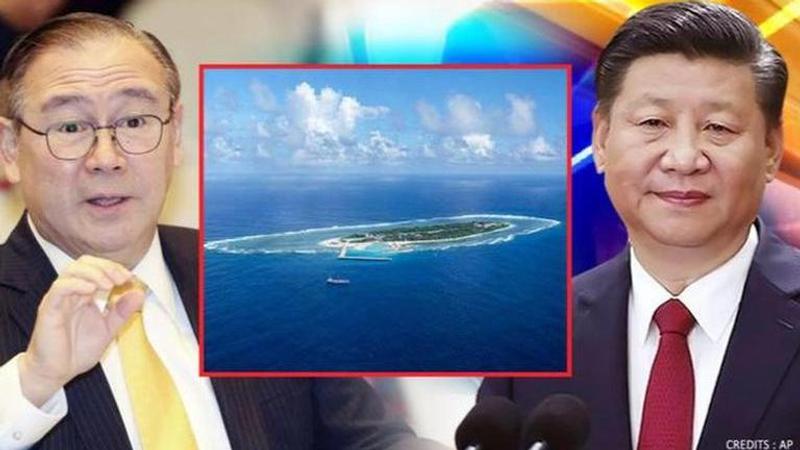Published 17:18 IST, May 1st 2021
Experts term China's coast guard law as 'verbal threat', slam it for 'legalising violence'
Concerns over domineering Coast Guard Law of China stating Beijing uses the law to legalise violence caused by its coast guard force's claim in South China Sea.

Disputes over the South China Sea, have compelled several foreign entities to outpour their opinions and inculpate China. In a recent development, international public opinion has raised concern over the domineering Coast Guard Law of China stating that Beijing uses the law to legalise violence caused by its coast guard forces in order to serve the country's unilateral sovereignty claim in the East Sea alias South China Sea.
China's Worrying New Coast Guard Law
The Coast Guard Law of China was adopted at the 25th session of the Standing Committee of the country's13th National People's Congress in late January and officially effective since February. Constituted of 11 chapters, the law says that the coast guards would supervise 11 aspects of the sea i.e. patrolling Chinese waters, demolition of foreign structures on China's reefs and islands (including artificial islands), eliminating terrorist activities, cracking down smuggling amongst other offences; also, overseeing the marine environment and other vessels' resource exploration, as well as searching and rescuing.
However, chapter 3 of the introduced legislation 'Maritime Security' confers powers on the coast guards to exercise "all necessary measures at sea; inclusive of resorting to weapons and ammunition at the time of threat to national sovereignty, sovereign rights and unlawful infringement of jurisdiction by foreign organisations or individuals.
Now, there exist a plethora of territorial disputes between China and its neighbours in the East and South China Seas. Wary countries hooked in territorial disputes with China anticipate basis precedence that latter may interpret the law as extending to the internal waters of islands that China categorises as territory of its own. Whereas according to China, the statute has been formulated to clarify the positioning of Chinese coast guards, their functions and to convey transparent regulation for international entities thus, when foreign coast guards interact with their Chinese counterparts, they are clear about their actions and potential repercussions.
Tensions in the South China Sea
Basis fair assumption that Chinese law is a verbal threat of war to any country that defies it, Philippine Foreign Secretary Teodoro Locsin Jr. filed a diplomatic protest with China over the law authorising its guards to fire on foreign vessels. At a reception for Indonesian Foreign Minister Retno Marsudi and Defence Minister Prabowo Subianto on March 30, Japanese PM Yoshihide Suga opined his concern over China's deeds in the waters denouncing the newly enforced legislation. The Director of University of Philippine's Institute for Maritime remarked,
"This shows the East Asian giant is just continuing with its plans to take over the South China Sea regardless of its ongoing negotiations with other States, uncluding its discussion with ASEAN for a Code of Conduct."
The spokesperson of Vietnamese Foreign Ministry Le Thi Thu Hang said that countries are obliged to comply with international laws and international treaties, especially the 1982 United Nations Convention on the Law of the Sea. He further said,
"Vietnam requires relevant countries respect its sovereignity, sovereign rights and jurisdiction in the East Sea and have the responsibility to enforce international laws without any action to increase tensions and actively contribute to bulding trust, maintaining peace and stability and promoting international order at sea, its security, safety and freedom of navigation in the East Sea."
China has been more assertive in sovereignty disputes of the South China Sea. According to research by the Centre of Strategic and International Studies (CSIS), significant numbers of vessels have been at Whitsun Reef since February 2020. Whitsun Reef is among maritime features in the Spratly Islands in the South China Sea. It is in a shallow coral region of the resource-rich Spratly Islands and is now at the centre of a deepening maritime row between Beijing and Manila. The said islands are subject to a territorial dispute and are in whole or partly claimed by numerous countries, namely, Brunei, China, Malaysia, Philippines, Taiwan and Vietnam.
China claims virtually all of the South China Sea while the Philippines claim the Spratly Islands as being within its exclusive economic zone alias West Philippines. A United Nations tribunal dismissed China's claim to virtually claiming all sovereignty of the South China Sea. Earlier, Beijing had rejected this ruling.
(With Agency Inputs)
Updated 17:18 IST, May 1st 2021




